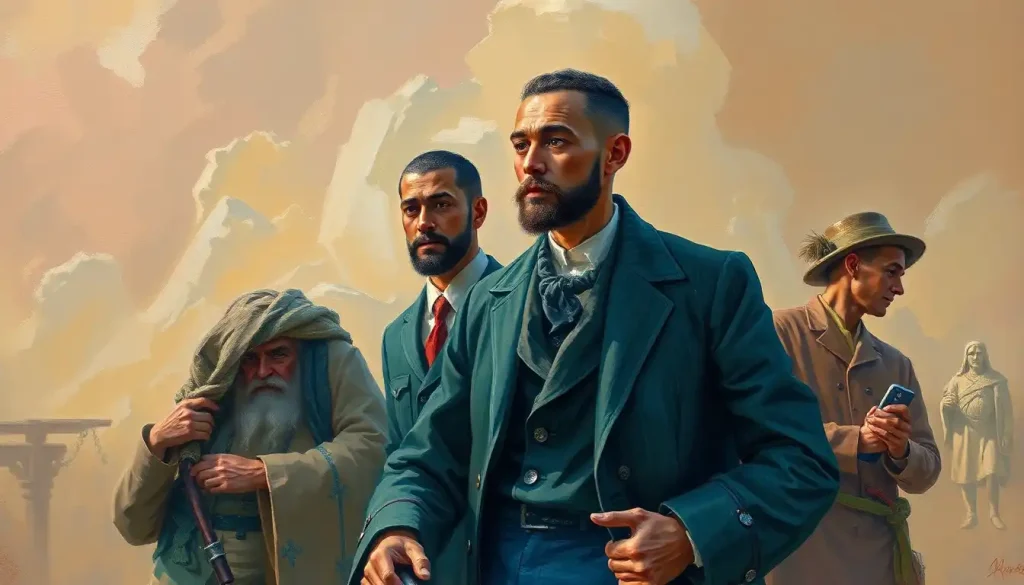From garage startups to million-dollar empires, the world of solo entrepreneurship is brimming with awe-inspiring tales of individuals who dared to chase their dreams and succeeded against all odds. These stories of grit, determination, and innovation serve as beacons of hope for aspiring entrepreneurs everywhere, illuminating the path to success in a world where traditional career paths are increasingly giving way to self-made opportunities.
The rise of solo entrepreneurship has been nothing short of revolutionary. A solo entrepreneur, often referred to as a solopreneur, is an individual who starts and runs a business entirely on their own. They wear all the hats – from CEO to janitor – and are responsible for every aspect of their venture. This trend has been gaining momentum in recent years, fueled by technological advancements, changing work cultures, and a growing desire for personal and professional autonomy.
The allure of solopreneurship is undeniable. It offers the freedom to pursue one’s passion, the flexibility to design one’s lifestyle, and the potential for unlimited financial growth. However, it’s not all sunshine and rainbows. The path of a solo entrepreneur is often fraught with challenges, from financial instability to the pressure of being solely responsible for every decision. It’s a rollercoaster ride that demands resilience, adaptability, and an unwavering belief in oneself.
Tech Titans: Digital Dynamos Making Waves
In the realm of technology and digital entrepreneurship, solo entrepreneurs have made significant strides, often disrupting entire industries with their innovative ideas and relentless drive.
Take, for instance, the story of Patrick McKenzie, a software developer who created Bingo Card Creator, a simple app for teachers to make bingo cards for their classrooms. What started as a side project soon turned into a profitable business, generating over $100,000 in annual revenue. Patrick’s success story is a testament to the power of identifying a niche problem and solving it effectively.
Digital marketing has also seen its fair share of solo success stories. Neil Patel, now a renowned digital marketing guru, started his journey as a solo entrepreneur, offering SEO services to local businesses. Through consistent content creation, networking, and relentless self-improvement, Neil built a personal brand that now reaches millions of marketers worldwide.
E-commerce, too, has been a fertile ground for solo entrepreneurs. Sophia Amoruso, the founder of Nasty Gal, started her empire by selling vintage clothes on eBay. Her keen eye for fashion trends and savvy marketing skills transformed her one-woman operation into a multi-million dollar fashion retailer.
Creative Visionaries: Turning Passion into Profit
The creative industry has long been a haven for solo entrepreneurs, with individuals turning their artistic talents into thriving businesses.
Joanna Penn, a prolific author and creative entrepreneur, started her journey as a solo writer and has since published numerous books, both fiction and non-fiction. She’s also built a successful business around helping other authors self-publish and market their work. Joanna’s story is a shining example of how solo entrepreneur ideas can evolve into multi-faceted businesses.
In the world of graphic design, Jessica Hische has made a name for herself with her distinctive lettering and illustration style. Starting as a freelance designer, Jessica has worked with major brands like Wes Anderson, Penguin Books, and The New York Times. Her success underscores the potential for solo creatives to carve out unique niches in competitive industries.
Photography and videography have also seen their share of solo success stories. Chase Jarvis, a self-taught photographer, built a multi-million dollar business around his craft. He not only shoots for major brands but has also created CreativeLive, an online education platform for creatives.
Service Superstars: Coaching, Assisting, and Consulting
The service industry has proven to be a goldmine for solo entrepreneurs, with individuals leveraging their expertise to help others succeed.
Marie Forleo, a life and business coach, started her career offering one-on-one coaching sessions. Today, she runs B-School, an online business program for entrepreneurs, and hosts MarieTV, a web show with millions of viewers. Marie’s journey exemplifies how a solo entrepreneurship venture can scale without losing its personal touch.
Virtual assistants have also found success in the solo entrepreneur space. Gina Horkey, for instance, built a six-figure business as a virtual assistant and then pivoted to teaching others how to do the same. Her story highlights the potential for solo entrepreneurs to not only succeed in their chosen field but also to create additional income streams by sharing their knowledge.
Consultants across various fields have shown that deep expertise in a specific area can be the foundation of a successful solo venture. Alan Weiss, known as the “Million Dollar Consultant,” built his empire by offering high-level consulting services to Fortune 500 companies. His success demonstrates that even in fields traditionally dominated by large firms, solo entrepreneurs can carve out lucrative niches.
Product Pioneers: From Handmade to High-Tech
Product-based businesses might seem daunting for solo entrepreneurs, but many have proven that with creativity and perseverance, it’s possible to build thriving product empires single-handedly.
In the world of handmade crafts, Alicia Shaffer’s Three Bird Nest Etsy shop is a prime example of solo entrepreneurial success. What started as a hobby making headbands grew into a business generating over $70,000 a month, making it one of the top-selling handmade product shops on Etsy.
Inventors and product designers have also found success as solo entrepreneurs. Ben Kaufman, the founder of Quirky, started his entrepreneurial journey by inventing a lanyard headphone for iPods. This led him to create Mophie, a successful tech accessory company, before he was even 20 years old.
Niche physical products have proven to be a goldmine for many solo entrepreneurs. Sarah Blakely, the founder of Spanx, started her billion-dollar shapewear company as a solo entrepreneur with just $5,000 in savings. Her story is a powerful reminder that with the right product and relentless determination, solo entrepreneurs can disrupt even the most established industries.
The Secret Sauce: Key Traits of Successful Solo Entrepreneurs
While the paths of these successful solo entrepreneurs may vary, they share several key traits that have contributed to their success.
Self-motivation and discipline are paramount. Without a boss or team to keep them accountable, solo entrepreneurs must be their own taskmasters. This often means pushing through challenges, maintaining focus, and staying committed to their goals even when the going gets tough.
Adaptability and a commitment to continuous learning are also crucial. The business landscape is constantly evolving, and successful solo entrepreneurs are those who can pivot quickly and are always eager to learn new skills. This might mean adapting to new technologies, exploring new marketing channels, or even completely reinventing their business model.
Effective time management and productivity are non-negotiable for solo entrepreneurs. With limited resources and countless tasks to juggle, the ability to prioritize effectively and maximize productivity is often the difference between success and burnout.
While these traits are essential, it’s important to remember that entrepreneur loneliness can be a real challenge. Building a support network, whether through mentorship, peer groups, or online communities, can be crucial in navigating the ups and downs of solo entrepreneurship.
The stories of these remarkable individuals serve as a testament to the power of determination, creativity, and resilience. From tech innovators to creative visionaries, service providers to product pioneers, solo entrepreneurs are reshaping the business landscape and proving that with passion and perseverance, one person can indeed build an empire.
As we look to the future, the trend of solo entrepreneurship shows no signs of slowing down. Technological advancements continue to lower barriers to entry across industries, while the gig economy and changing work preferences are pushing more individuals to explore entrepreneurial paths.
For those inspired by these stories and considering their own solo entrepreneurial journey, remember that every empire starts with a single step. The path may be challenging, but as these solo entrepreneur stories show, the rewards – both personal and professional – can be extraordinary.
Whether you’re dreaming of launching a tech startup, building a creative business, offering specialized services, or creating innovative products, the world of solo entrepreneurship is wide open. With the right idea, unwavering determination, and a willingness to learn and adapt, you too could be the next success story in the ever-expanding universe of solo entrepreneurship.
So, are you ready to take the leap and write your own solo success story? Remember, every lifestyle entrepreneur example we’ve explored started with a single bold decision. Your journey to becoming a successful solo entrepreneur begins now. Embrace the challenge, revel in the freedom, and get ready to make your mark on the world, one solo venture at a time.
References:
1. Guillebeau, C. (2012). The $100 Startup: Reinvent the Way You Make a Living, Do What You Love, and Create a New Future. Crown Business.
2. Kawasaki, G. (2015). The Art of the Start 2.0: The Time-Tested, Battle-Hardened Guide for Anyone Starting Anything. Portfolio.
3. Ferriss, T. (2007). The 4-Hour Work Week: Escape the 9-5, Live Anywhere and Join the New Rich. Vermilion.
4. Ries, E. (2011). The Lean Startup: How Today’s Entrepreneurs Use Continuous Innovation to Create Radically Successful Businesses. Crown Business.
5. Gerber, M. E. (1995). The E-Myth Revisited: Why Most Small Businesses Don’t Work and What to Do About It. HarperCollins.
6. Amoruso, S. (2014). #GIRLBOSS. Portfolio.
7. Forleo, M. (2019). Everything is Figureoutable. Portfolio.
8. Blakely, S. (2022). The Wind at My Back: Resilience, Grace, and Other Gifts from My Mentor, Coretta Scott King. Penguin Press.
9. Horkey, G. (2020). Start Your VA Business in 5 Days. Horkey HandBook.
10. Weiss, A. (2016). Million Dollar Consulting: The Professional’s Guide to Growing a Practice, Fifth Edition. McGraw-Hill Education.












Would you like to add any comments? (optional)